Location
Lifeworks, LLC
246 Mathis Ferry Road, Suite 100
Mount Pleasant, SC 29464
843.971.5171
Resources
Psychology Research
Check out Dr. Brian Sullivan’s Psychology Research.
ADHD is considered a neurobiological condition. Yet the traits of ADHD are not the only problem for the adult with this condition. It is often the negative self-esteem and defeatist attitudes that develop as a result of the symptoms that are the most damaging. Cognitive behavioral therapy can be especially effective in addressing these issues.
Cognitive behavioral therapy is also a practical method of treatment that helps clients deal with the day to day issues that impede their success. Many adults with ADHD have difficulty with organization, prioritizing, and follow-through. Some adults with attentional difficulties tend to ramble, have trouble remaining on topic, and often forget what they’ve committed to do.
Cognitive behavioral therapists use a number of techniques that focus specifically on these issues. Choosing a specific topic or topics to work on each session is one goal of the cognitive session. Determining what the client will do about the issue discussed, how he can work on it, and how to evaluate its success are all topics for treatment. Clear-cut goals are developed and there are frequent check-ins on those goals. This can prevent rambling and jumping from one topic to another which can interfere with the treatment of the ADHD client.
The cognitive behavioral approach to therapy encourages therapists to bring up issues from previous weeks to continually evaluate progress. This can be extremely helpful for the adult with ADHD who easily loses track of his/her long term goals as he/she focuses on whatever seems most pressing at the moment. Working with a cognitive therapist, the client will be reminded to attend to areas of success while also refining strategies to help deal with those incomplete tasks.
At Lifeworks Charleston, we know how to diagnose ADD and ADHD. We are serious about these disorders and we can help. Call us at 843 971-5171, or email us: info@lifeworkscharleston.com
Diagnosis for ADD/ADHD is a powerful step toward relief from its symptoms—and the process toward getting this diagnosis doesn’t have to be confusing. There are a variety of health care professionals whose jobs are to help you diagnose and treat ADD/ADHD, and steps you can take to get started on your own.
Whether you are seeking a diagnosis for yourself or your child, educating yourself about the evaluation for ADD/ADHD—from the many specialists available to what a diagnosis really means—can help you feel more confident about your role in the diagnostic process. And most importantly, obtaining and understanding a proper diagnosis of ADD/ADHD can get you on the path toward help and treatment.
There is no single medical, physical, or other test for diagnosing ADD/ADHD. To determine if you or your child has ADD/ADHD, a doctor or other health professional will need to be involved, and you can expect him or her to use a number of different tools: a checklist of symptoms, answers to questions about past and present problems, or a medical exam to rule out other causes for symptoms. Keep in mind that the symptoms of ADD/ADHD, such as concentration problems and hyperactivity, can be confused with other disorders and medical problems. Just because it looks like ADD/ADHD doesn’t mean it is, so getting a thorough assessment and diagnosis is important.
Finding out that you or your child has been diagnosed with something—whether it’s an ear infection, a learning disability, or ADD/ADHD—may feel at first scary or intimidating. In fact, an ADD/ADHD diagnosis can be the first step toward making life better: you can seek treatment immediately, and that means managing symptoms and feeling more confident in every area of life.
ADD/ADHD looks different in every person, so there is a wide array of criteria—or measures for testing—to help health professionals reach a diagnosis. It is important to be open and honest with the specialist conducting your evaluation so that he or she can come to the most accurate conclusion.
Many adults wonder if they might have ADD or ADHD. The Attention Deficit Disorder Association provides a free quiz and Memorial Park Psychiatry provides a free screening tool to help you to determine whether consultation with a specialist like Dr. Sullivan might be needed.

Dr. Brian Sullivan is a licensed clinical psychologist with over 25 years of experience. He holds a PsyD Doctorate in Clinical Psychology as well as a Master’s Degree in Clinical Psychology from Florida Institute of Technology (FIT). Dr. Sullivan believes his job is to work himself out of a job by helping people reach a point at which they no longer need his help.
Lifeworks, LLC
246 Mathis Ferry Road, Suite 100
Mount Pleasant, SC 29464
843.971.5171
Check out Dr. Brian Sullivan’s Psychology Research.
Lifeworks, LLC